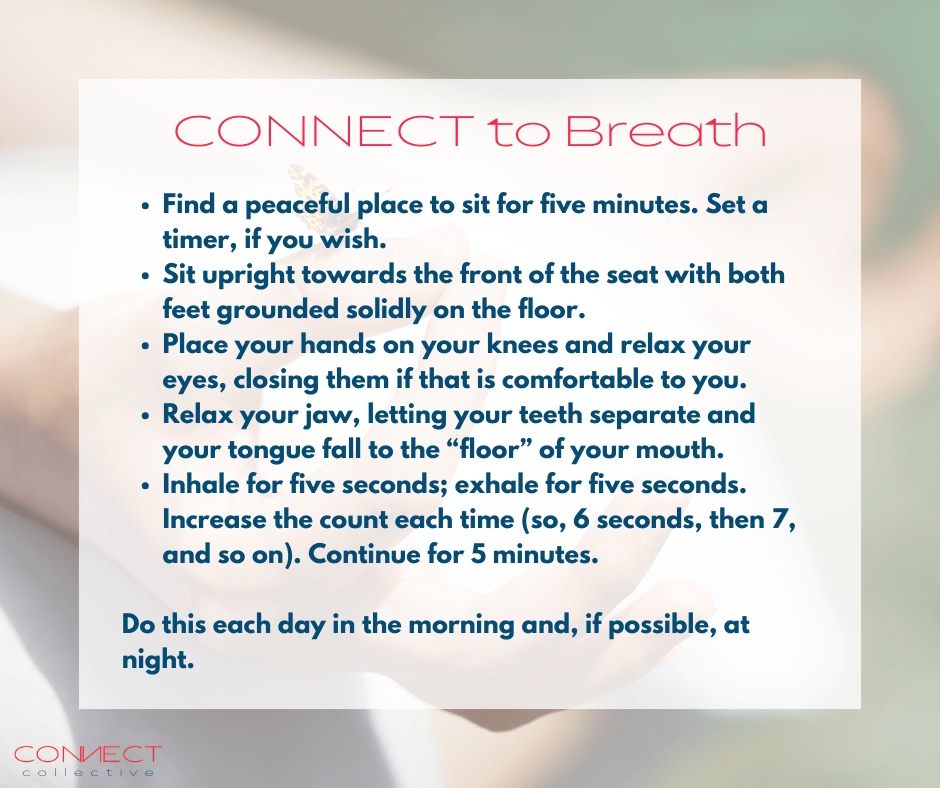- CONNECT collective
- Posts
- How to Recover (when you're burned out on recovering)
How to Recover (when you're burned out on recovering)

The past few weeks have been a massive attack on the east coast. Hurricanes ripped through, literally tearing communities apart. Some communities will never recover. New ones will be built, but they won’t be the same. Everyone in the paths of Helene and Milton have experienced some level of trauma.
Trauma is something every person experiences in the course of life. The death of a loved one creates trauma. Major life changes such as occupational changes or moving can create trauma. Sometimes the recovery process is overwhelming and exhausting, leading to a feeling of burnout.
Like grief has stages, so does recovery. I see segments of the grieving process housed within recovery. There are several models of trauma recovery, but the Extended Transformational Model aligns closely with my own personal experiences and resonates with what I understand.
Knowing what to expect provides a level of comfort, so I’ll provide a brief explanation of the stages presented in the Extended Transformational Model of trauma before transitioning into practices you can implement today.
Extended Transformational Model
Pre-trauma characteristics. This is your life before the trauma - who you were and how you operated in the world. Life before the traumatic event is a snapshot of held ideas, traits, and beliefs that will change as a result of what you’ve experienced.
Rumination. A period of rumination is normal and makes room for you to process what happened, why, how, etc. However, it is easy to linger in this space for too long, creating dis-ease and disharmony. Recovery burnout takes root here. Tap into your self-awareness so you can identify when you are reinforcing stories that do not serve you and disrupt your path toward healing.
Event centrality. This is when you turn the proverbial corner and pivot. You objectively analyze who you were before the trauma and how the experience changed you. You must let go of what was to move forward (acceptance).
This can be challenging, especially if once familiar beliefs, ideas, or traits have shifted. Strongly held beliefs may fall into a gray area or move to the opposite spectrum. Personality traits can change, making you feel lost. For example, if you were once a very organized Type A personality, you may flip to a little disorganized and laissez-faire.
People may take notice and comment on your change, which can either make you feel supported or rejected. It isn’t unusual to hear things like, “You used to be so outgoing. What happened?” or “You used to be super punctual, but now you’re never on time!” after we’ve traversed tough terrain, but it isn’t helpful.
Control. When you lack perceived control you feel unsafe and unsecure. In this stage you take steps to regain control of your life. Trauma changes you. The change may be slight, it may be temporary, but it will change you. Be mindful of your desire to spring back to “normal.” You will find yourself moving further away from the pre-trauma snapshot version of you (what no longer is) and toward a sustainable life post-trauma.
Mastery. In this stage you adapt to life post-trauma. This is the new norm. This sounds scary and maybe contrived or fake, but it is just the flow of life happening.
*Let’s remove it from the context of trauma altogether with a silly example. My favorite Greek yogurt is Fage. It used to be $6.99 for 32 ounces. One week it was the “normal” price of $6.99, then the next it was $7.49! That price is the new norm, whether I accept it or not. Let’s call the price change from $6.99 to $7.49 a traumatic event. That event affects me directly as the consumer. I can’t control the event; however, I have choices. I can buy it at $7.49, I can buy a new brand, I can forgo yogurt completely, or I can go all Little House on the Prairie and make my own.
I analyze my experience and, depending on my interpretation and reaction to the event, I will make changes that become my new norm. Let’s say I choose the Little House path. Now, I am a person who makes her own yogurt; whereas before, I had no clue how to do such a thing or that someone could even do that.
Mastery is simply adapting to our reality post-trauma.
(*This example may be rooted in real events.)
Time Heals, But How Quickly?
Your experiences are unique to you. This is generally true about life and applies to trauma, as well. Even when a group of people experience the same traumatic event (e.g., a hurricane, a death in the family, mass layoffs, etc.), they each process the event differently.
Be aware of comparing your interpretation and reaction to an event to someone else’s. You may perceive you are recovering far faster than another, or that you are way behind schedule. There is no schedule. Don’t burnout on recovery because you expect it to occur at a certain pace. If you push the process, it can delay recovery.
A Question of Closure
Closure is not definitive - it is whatever you say it is. Closure is an expectation. “If I get ____, then I will feel closure.” What if you don’t find the closure you seek?
When you give a situation out of your control an ultimatum (and it doesn’t play out as expected), it can lead to recovery burnout.
Sometimes you don’t get to choose when one chapter ends and another begins. We’ve discussed The Expectation Gap in previous newsletters. This the gap between what we want and what we get, and it impedes our healing journey. Healing is given permission to intercede when you can accept, let go, and move on.
What is your understanding of closure? I used to view closure as a complete understanding of the situation. I thought closure was finding out why something happened. That view has shifted overtime. I now see closure as acceptance, not as answers to all my questions. I’m okay with not having all the answers. That is closure.

The Peripherals
Orbiting around your internal turmoil may be external things that you simply must address. Dealing with a demolished home and insurance after a hurricane or managing the estate of a family member who has passed. Juggling these necessary things while you are trying to catch your breath can lead to recovery burnout.
Mind your time. Schedule the “must do” items, as well as the “need to do” items. For example, you must contact insurance or call the lawyer. However, you need to eat healthy meals and sleep so you have the energy to manage the must do tasks.
Below I suggest a few of our tried and true CONNECT practices with some tweaks to aid you in your healing process.
Expressive Yourself
Expressive writing has been shown to alleviate stress and aid in processing events. In other words, it can help you make sense of what happened. Journal pages are safe havens for expressing our thoughts and emotions towards an event without fear of judgment.
Some researchers suggest creating some space (1-2 months) between the time of the event and when you write about it; however, it is contingent on the individual’s state. Speaking from my own personal experience with debilitating burnout I wrote the whole time, including at the inception. That is what worked best for me. If journaling feels more injurious than healing, don’t do it. It proved to be an outlet in my situation.
Breathwork
When you experience trauma you may unconsciously “grab” the breath or breath in a shallow manner. Taking five minutes once a day (or better yet, twice a day) to practice mindful breathing syncs up the sympathetic and parasympathetic nervous systems. This trains your body to cope with the ingrained fight, flight, freeze mechanism that kicks in automatically.
Breathwork practice does not need to be (and should not be) complex. See the breathing practice below.

Practices such as breathwork, visualization, and meditation are so powerful that they are increasingly being integrated into PTSD recovery globally. Research is growing and overwhelmingly positive. These practices are free, impactful, and holistically (body, mind, spirit) supportive.
Get Your Zzzzz’s!
Do not allow the chaos of trauma and the recovery afterwards to rob you of your sleep. Sleep is not something you do just so you start the next day feeling fresh; it is a biological necessity. Your body depends on sleep to engage in necessary repairs.
Studies of sleep deprivation show that going without shuteye for a 24 hour period is the equivalent of experiencing a blood-alcohol content of 0.10. You are literally sleep drunk!
Cognitive impairment. Lack of sleep leads to confusion and unclear thoughts. Your body loses physical coordination.
Irritability. You become emotionally compromised and struggle to control your reactions.
Paranoia: Your heightened emotional state may lead to projecting stories that are not based in reality.
Psychosis: Extreme loss of sleep can result in hallucinations, as well as other signs of psychosis.
A Walk in the Park
My final suggestion is to walk regularly - 10-15 minutes, two-three times a day. Be in nature, if at all possible.
I have previously discussed the endorphins released when you exercise, but let’s consider it from a more elementary perspective. When you suffer trauma, you become a container for tense, negative energy throughout your body. The motion of walking allows you to release that energy. You are flinging it away from your body. Windmilling, body shaking, and body tapping all have similar effects.
Judgment Free
Recovery is a process, and you may find yourself revisiting thoughts and emotions that you believed to be dealt with and put away. You may find yourself uncharacteristically short-tempered or exhausted or unable to complete simple tasks. Put self-care first and surround yourself with your family and friends.
Give yourself (and others) space and grace.
Do You Need Help Tapping Into Your Potential?
Are you struggling to meet your goals and wish you had support? Have you ever considered working with a coach? You may not know what a coach does.
One-on-One Coaching:
You and I develop an individualized plan targeting your specific goals
You receive individualized support from me
Answers to your specific questions
Guidance on your specific issues and blocks
Accessibility to me outside coaching sessions for added support (individual texts and emails to check in)
Your plan leads to learning how your personal growth is in your control
Are you ready to take action but are at a loss on what step to take next?
I can teach you how to get started and accelerate your growth by using repeatable methods. Need the tools? I’ve got them. The goal is always to make you independent. I should be working myself out of a job. Once you take off, you may want to have a session from time to time, especially if you are scaling your goals. A good coach teaches you how to stand on your own two feet. Contact me today. Are you ready to CONNECT?

Resources: